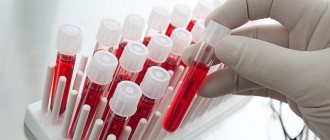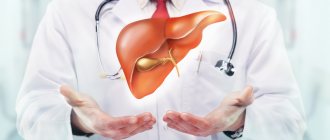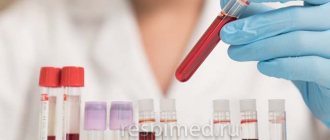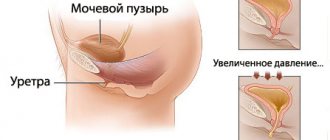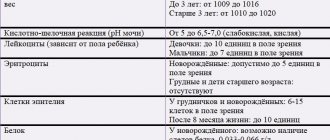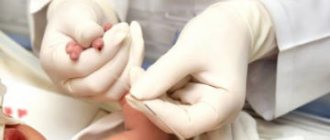The analysis is prescribed by the attending physician, pediatrician if indicated, and also to monitor the child’s health status. Blood is taken from a vein in a laboratory, after which a specialist makes a decoding based on the data obtained.
Biochemical blood test for children at the Osnova clinic
In St. Petersburg, a biochemical analysis of a child’s blood is carried out by the Osnova Children clinic on the basis of a modern laboratory and a multidisciplinary medical center. You will receive accurate results that will make it possible to make a correct diagnosis or obtain information about the child’s health condition.
Our place is clean, cozy, bright and accessible - sign up for a test so you don’t have to wait in line. The administrator of the Osnova clinic will tell you how to prepare your child for the test.
If you save your time, our nurse can come to your home to take blood for analysis. The result (transcript) can be sent by email.
How to prepare a child for a biochemical blood test
- You need to exclude fatty and sweet foods from your diet. The day before the test, it is advisable to follow a diet.
- It is not advisable to take any medications 12 hours before the test (if they are not vital, consult your doctor).
- The child can drink water as usual, but avoid coffee, strong tea, and carbonated drinks.
- The analysis is carried out on an empty stomach, in the morning; the administrator will select a suitable time for you.
The procedure is virtually painless and takes minimal time. Blood is drawn from a vein. If the child is already able to understand, then it is worth telling him about the importance of research and the health benefits. Blood is donated before 12 noon, but in emergency cases, diagnostics are carried out at any time.
Indications
Biochemistry is a blood test that a doctor prescribes for a child when:
- complaints of poor health;
- diagnosis of pathologies of systems and organs;
- diseases associated with impaired metabolism;
- pathologies of the liver, spleen, kidneys, heart;
- impaired hormonal metabolism;
- infectious diseases;
- acute surgical conditions, as well as in preparation for surgery;
- detection of hereditary diseases and congenital pathologies.
Biochemistry is also a component of preventive research and an important stage in monitoring the effectiveness of therapy in the fight against a number of pathological conditions.
BLOOD TESTS FOR INFECTIONS
1-2 days before the test, exclude high-fat foods from your diet. 2 days before donating blood for viral hepatitis, exclude citrus fruits, orange fruits and vegetables from the diet. The results of tests for the presence of infections depend on the period of infection and the state of the immune system, so a negative result does not completely rule out infection. At an early stage of the disease, seroconversion occurs (absence of antibodies during the acute period of the disease). In doubtful cases, it is advisable to re-test after 3-5 days. A blood test for the presence of IgM to infectious agents should be carried out no earlier than 5-7 days from the moment of illness, and IgG and IgA no earlier than 10-14 days. This is due to the timing of the production of antibodies by the immune system and their appearance in the blood in the diagnostic titer.
Use of capillary blood when collecting blood from children
The veins of young children are very thin, so the use of capillary blood when taking blood from children is of great importance. This is a simple procedure that is performed using a disposable instrument (scarifier) and a special Microvett tube and takes 1 to 2 minutes.
In newborn children, capillary blood is taken not from the finger, but from the heel. This is a well-supplied area from which you can quickly obtain the required amount of blood for testing. The procedure is carried out as quickly as possible in order to cause the child as little discomfort as possible.
BIOCHEMISTRY
Urea
1-2 days before the study, you must follow a diet: stop eating foods rich in purines - liver, kidneys, and also limit meat, fish, coffee, tea in your diet as much as possible. Intense physical activity is contraindicated.
Cholesterol, lipoproteins
Two weeks before the study, it is necessary to discontinue drugs that lower blood lipid levels, unless the goal is to determine the lipid-lowering effect of therapy with these drugs.
Glucose
When donating blood for glucose (in addition to the basic requirements for preparing for tests), you should not brush your teeth, chew gum, or drink tea/coffee (even unsweetened). A morning cup of coffee will dramatically change your glucose levels. Contraceptives, diuretics and other medications also have an effect.
Glucose tolerance test
It is carried out only if there are preliminary results of determining glucose on an empty stomach, without load. The glucose content in blood plasma is determined on an empty stomach and 2 hours after a glucose load. It is necessary to follow a normal diet (with a carbohydrate content of more than 125-150 g per day) and adhere to the usual physical activity for three days before the study. The study is carried out in the morning on an empty stomach after an overnight fast for 12-16 hours (during this time you should not smoke or drink alcohol). During the study, the patient should lie or sit quietly, not be overcooled and not engage in physical work. It is not recommended to conduct research after and during stress, after operations and childbirth, during inflammatory processes, alcoholic cirrhosis of the liver, hepatitis, during menstruation, and in gastrointestinal diseases with impaired glucose absorption. Before the test, it is necessary to exclude medical procedures and medications (adrenaline, glucocorticoids, contraceptives, caffeine, thiazide diuretics, psychotropic drugs and antidepressants). Discontinuation of medications is carried out only after preliminary consultation of the patient with a doctor.
for CHILDREN UNDER 14 YEARS OLD .
PREGNANT women are recommended to carry out a glucose tolerance test at 24-28 weeks, this allows identifying women with gestational diabetes with an accuracy of 98%.
How and where is blood taken from a vein in an infant?
How blood is taken from a vein from a baby in a children's clinic
- The ulnar flexure is the most common site for collecting venous blood from babies. The procedure is no different from adults - you need to tighten your hand with a tourniquet and lubricate the sampling site with alcohol. Next, the vein is punctured, the blood is collected in a test tube, the tourniquet is removed, the needle is removed from the vein and cotton wool moistened with alcohol is applied to the injection site. But such a place for taking blood may not always be suitable for infants up to 3-4 months and newborn babies, because they are very small and it is almost impossible to feel the veins
- Veins on the forehead or head
- Veins of the forearm
- Back of the palm
- Calves of the legs
Such places are used for drawing blood if it is impossible to find a vein in the baby for drawing blood in the rest of his body.
Tests in children
Pediatrician, candidate of medical sciences Ovsyannikov D.Yu.
- Complete blood count in children, frequent indications
- Biochemical blood test in children, frequent indications
- Hemostasiogram
Pediatrician, candidate of medical sciences Ovsyannikov D.Yu.
General blood test in children, frequent indications Biochemical blood test in children, frequent indications Hemostasiogram
Complete blood count in children, frequent indications
| Indications | Possible reasons | Additional examination |
| Paleness, loss of appetite, lethargy, bedwetting, fatigue, sudden love for certain smells, eating certain substances (chalk, earth) | Anemia | Complete blood count Serum iron Iron binding capacity of serum Transferrin |
| Prolonged jaundice (more than 14 days) in a newborn baby | Hepatitis Hemolytic disease of newborns Hypothyroidism | Complete blood count ALT AST Alkaline phosphatase Cholesterol TSH T3 free T4 free |
| Malnutrition - decrease - increase | Anemia Hypotrophy Obesity | General blood test Biochemical blood test |
| Long-term colds, fever (high temperature above 38 degrees for more than 3 days), deciding whether to prescribe antibiotics | Bacterial infection, urinary tract infection, acute pyelonephritis | General blood test General urine test (urinalysis according to Nechiporenko) C-reactive protein Biochemical blood test Ultrasound of the kidneys |
Biochemical blood test in children, frequent indications
| Indications | Possible reasons | Additional examination |
| Increased excitability of the child, which began suddenly after the 3rd week of life, poor sleep, bald nape, soft edges and late closure of the large fontanel, late teething | Rickets (hypovitaminosis D) | Biochemical blood test: calcium phosphorus Alkaline phosphatase Calcium in urine |
| Pain in the right hypochondrium, feeling of heaviness after eating fatty foods, fatty stools | Biliary dyskinesia Liver diseases Pancreas diseases | Blood biochemistry: Total bilirubin Direct bilirubin ALT AST Alkaline phosphatase GGTP Ultrasound of the abdominal organs, gall bladder |
| Excessive urine output, thirst, weight loss, obesity | Diabetes mellitus and other carbohydrate metabolism disorders | Blood glucose Glycated hemoglobin Fructosamine Sugar curve (glucose tolerance test) |
| Pain in the big toe, kidney stones, gall bladder | Gout Urolithiasis disease | Ultrasound uric acid level |
Hemostasiogram
| Indications | Possible reasons | Additional examination |
| Bleeding, prolonged menstruation | Thrombocytopathy, thrombocytopathy | Complete blood count Hemostasiogram Platelet aggregation |
The information provided in this message contains general information and should not be considered medical advice and cannot replace the advice of a physician.
Blood test biochemistry
A blood test for biochemistry is highly informative and reliable for your doctor. Currently, almost all specialists in any field of modern medicine use the results of this laboratory analysis in their practice.
When is it recommended to perform a blood chemistry test?
First of all, you can do it yourself, despite the fact that you feel absolutely healthy, in order to make sure that your body is working properly and to identify possible diseases at an early stage. Almost all people under 40 years of age are recommended to perform this type of blood test annually, and at a later age - once every six months. Doctors usually prescribe a blood test for biochemistry (biochemical composition of blood) in the following situations:
- the presence of acute and chronic diseases of the liver, kidneys, pancreas,
- presence or suspicion of hereditary diseases,
- infection or intoxication of the body,
- vitamin deficiencies, pregnancy and in many other cases,
- when it is necessary to correctly diagnose or evaluate the functioning of the patient’s body as a whole.
Blood test for biochemistry: how to take the test correctly?
It is necessary to donate blood on an empty stomach, 7-9 hours after eating. At this time, you can only drink water, and sweet tea, coffee, and especially alcoholic drinks should be excluded. That is why blood sampling for biochemistry is usually carried out in the morning; in this case, you just need to postpone breakfast.
Biochemistry blood test - what does it show?
Or more precisely, it would be to ask what possible reasons influenced the deviation from the norm of this or that indicator in the analysis. You can find out about possible reasons for such deviations on our website - just indicate your values. Deciphering a blood test online allows you to determine the deviation of the main indicators from the norm, find out the possible causes of such deviations and thus prepare for an appointment with a doctor. Only a doctor can make a final diagnosis.
Biochemistry blood test: decoding and interpretation of analysis indicators.
Indicators of a blood test for biochemistry provide the attending physician with a variety of information about the functioning of the organs and systems of our body, including the immune and endocrine systems, metabolism, the functioning of the kidneys, liver, glands, intestines, heart, and the presence of numerous diseases: hepatitis, rheumatoid arthritis, polymyositis , pancreatitis, the presence of oncological tumors and many others.
What is included in the complex
- Clinical blood test with leukocyte count and ESR (with microscopy of a blood smear to detect pathological changes) (venous blood)
- Total protein
- 25-OH vitamin D total (25-OH vitamin D2 and 25-OH vitamin D3 total result)
- Glucose (fluoride)
- Glycated hemoglobin (HbA1c)
- Alanine aminotransferase (ALT)
- Aspartate aminotransferase (AST)
- Gamma-GT
- Indirect bilirubin (direct bilirubin, total bilirubin)
- Total calcium
- Creatinine
- Urea
- Total cholesterol
- FSH
- Estradiol
- 17-OH-progesterone
- DGA-S
- TSH
- Testosterone
- OZhSS (Serum iron, LZhSS)
